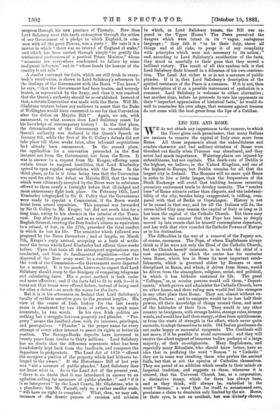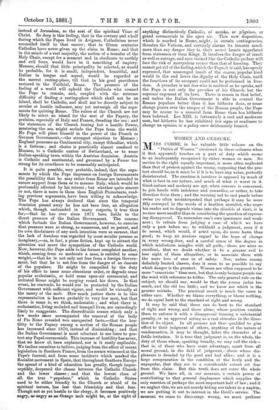LEO XIII. AND ROME.
Wdo not attach any importance to the rumour, to which the Times gives such prominence, that many Italians are anxious to remove the capital of Italy once more from Rome. All those arguments about the unhealthiness and sombre character and bad military situation of Rome were threshed out finally when Florence was abandoned, and they never had much importance. Watering-places are injured by unhealthiness, but not capitals. The death-rate of Dublin is the highest, we believe, in the United Kingdom, and one of the highest in Europe, but Dublin remains for all that the largest city in Ireland. The Romans will no more quit Rome in order to live a little longer, than the frequenters of the Stock Exchange will avoid that building because recurring pecuniary excitement tends to develop insanity. The "sombre tone" of Rome attracts rather than disgusts, and the indefensi- bility of the city, besides being exaggerated, is trifling, com- pared with that of Berlin or Copenhagen. History is not to be erased in that way, and for all the Italians will do, the seven-hilled City may remain the capital of Italy as long as it has been the capital of the Catholic Church. But there may be more in the rumour that the Pope has been so deeply moved by late events that he himself contemplates departure, and has with that view sounded the Catholic Powers of Europe as to his destination.
The difficulties in the way of a removal of the Papacy are, of course, enormous. The Pope, of whom Englishmen always think as if he were not only the Head of the Catholic Church, but the Church herself incarnate, is in truth the chief of a vast organisation, of which the centre has for centuries been Rome, which has in Rome its most important estab- lishments, which is governed either by Romans or men disciplined in Rome, and which, if driven from Rome, would be driven from the atmosphere, religious, social, and political, in which it has hitherto sustained its life. The great "Colleges," or, as secular persons would call them, "Depart- ments," which govern and administer the Catholic Church, have no other home, and their ruling men would feel like strangers in any other place than Rome. They are, almost without ex- ception, Italians ; and to emigrate would be to lose half their powers, all their knowledge of things around them, and most of the habitudes of their lives. They would in any other country be foreigners, with strange habits, strange rules, strange wants, and would lose half their energy, either from spiritlessness, or from the waste of strength in the effort, which never quite succeeds, to adapt themselves to exile. Old Italian gentlemen do not make happy or successful emigrants. The Cardinals will not move, if it be possible to avoid movement ; and they will receive the silent support of immense bodies, perhaps of a large
majority, of their co-religionists. Many Englishmen, and especially many Ritualists, who should know better, have an idea that in prefixing the word " Roman " to " Catholic " they are in some way insulting those who profess the ancient faith, but that is not the opinion of Catholics themselves. They are proud of an addition which recalls to their minds an Imperial tradition, and suggests to them, whenever it is uttered, that the Universal Church has, as a corporation, a distinctive stamp, which for them has always been, and as they think, will always be, embodied in the word "Roman," a word that for itself, to accustomed ears, proclaims a claim to dominion only limited by the air. Rome, in their eyes, is not an accident, but was divinely chosen,
instead of Jerusalem, as the seat of the spiritual Vicar of Christ. So deep is this feeling, that in the century and a half during which the Popes lived in Avignon, Catholicism never reconciled itself to that centre ; that in fifteen centuries Catholics have never given up the claim to Rome; and that in the minds of a vast majority, the notion of a transfer of the Holy Chair, except for a moment and in obedience to earthly and evil force, would have in it something of impiety. Monaco, should that little principality be selected, as would be probable, for it is small, independent, beautiful, and Italian in tongue and aspect, would be regarded as the merest resting-place, till God in his good providence restored to the Faithful, Rome. The pressure of the feeling of a world will uphold the Cardinals who counsel the Pope to remain, and, coupled with the extreme difficulty of finding a resting-place which shall not be an island, shall be Catholic, and shall not be directly subject to secular or hostile influence, may yet outweigh all the argu- ments for quitting Rome. The rulers of the Church are not likely to select an island for the seat of the Papacy, the prelates, especially of Italy and France, dreading the sea ; and the statesmen of the Church fearing lest a hostile Power, mastering the sea, might seclude the Pope from the world. No Pope will place himself in the power of the French or German Government, —the strongest objection to Monaco ; England possesses no Continental city, except Gibraltar, which is a fortress ; and choice is practically almost confined to Monaco, to a Catholic canton of Switzerland, or to some Italian-speaking town within the Austrian dominion. Austria is Catholic and continental, and governed by a Power too strong for its overthrow to be reasonably anticipated.
It is quite possible, very probable, indeed, that the argu- ments by which the Pope impresses on foreign Governments the possibility that he may retire from Rome are intended to secure support from them or to menace Italy, which would be profoundly affected by his retreat ; but whether quite sincere or not, there is more in them than English Protestants, read- ing previous arguments, have been willing to acknowledge. The Pope has always declared that since the temporal dominion passed away he has not been free, an allegation which, though unfounded in many respects, is true thus far,—that he has ever since 1871 been liable to the direct pressure of the Italian Government. The reasons which forbade the Italian Government, however, to exercise that pressure were so strong, so numerous, and so patent, and its own disclaimers of any such intention were so earnest, that the lack of freedom was regarded by most secular persons as • imaginary,—as, in fact, a pious fiction, kept up to attract the attention and move the sympathies of the Catholic world. . Now, however, the Pope adds to his former complaint another, which, coming from so moderate a man, is entitled to some weight,—that he is not only not free from a foreign Govern- ment, but that he is not free from the danger of an emeute of the populace. He might be compelled by the duty of his office to issue some obnoxious order, or degrade some popular ecclesiastic, or hold some open-air ceremonial, and irritated Rome might be surging round his doors. In that event, he contends, he would not be protected by the Italian Government with sufficient vigour, and would be virtually at the mercy of the mob. How much justice there is in this representation is known probably to very few men, but that there is some is, we think, undeniable ; and what there is, ecclesiastics, living secluded and tranquil lives, are exceedingly likely to exaggerate. The discreditable scenes which only a few weeks since accompanied the removal of the body of Pio Nono revealed two unexpected facts,—that the hos- tility to the Papacy among a section of the Roman people has increased since 1870, instead of diminishing ; and that the Italian Government is most reluctant to use force to pro- tect any Papal ceremonials. This increase of hostility has never, that we know of, been explained, nor is it easily explicable. We incline ourselves to believe, judging from the effect of recent legislation in Southern France, from the scenes witnessed at the Pope's funeral, and from some incidents which marked the Socialist movement in Spain, that throughout Southern Europe the spread of a kind of education has greatly, though imper- ceptibly, deepened the chasm between the Catholic Church and the lower classes ; and that the lowest class of all, the true "populace," which in Catholic States • used to be either friendly to the Church or afraid of its spiritual terrors, has lost that friendship and that fear.
• Though not as yet hostile to the clergy, it becomes positively angryvaa angry es awerange mob might be, at the sight of
anything distinctively Catholic, of monks, or pilgrims, or grand ceremonials in the open air. This new disposition, which is marked in Rome, might, in certain contingencies, threaten the Vatican, and certainly alarms its tenants much more than any danger they in their secret hearts apprehend from statesmen or from Kings. It involves the danger of insult as well as outrage, and men trained like the Catholic prelacy will face the risk of martyrdom sooner than that of hooting. They cannot get rid of the feeling, which the Pope, it is said, has openly expressed, that unavenged insult of the coarse, popular kind would in the end lower the dignity of the Holy Chair, until the functions of its occupant could not be performed in free- dom. A preacher is not free who is mobbed as he speaks, and the Pope is not only the preacher of his Church, but the supreme exponent of its laws. There is reason in that belief, and unless the Italian Government is able to control the Roman populace better than it has hitherto done, or some change passes over the temper of the Roman people, the Pope may be nearer to a removal from Rome than has hitherto been believed. Leo XIII. is fortunately a cool and moderate man, but hitherto he has exhibited few signs of readiness to change an opinion or a policy once deliberately formed.



































 Previous page
Previous page